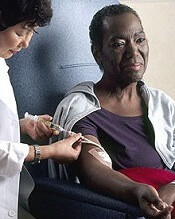
chemotherapy
Photo by Rhoda Baer
The European Society of Cardiology (ESC) has launched a novel position paper, under the auspices of its Committee for Practice Guidelines, on the cardiac toxicity of anticancer therapies.
The paper is a summary and evaluation of relevant scientific evidence that is intended to assist health professionals in selecting the best strategies for preventing and managing cardiac toxicity in patients with cancer, including leukemia, lymphoma, and multiple myeloma.
The paper was published in European Heart Journal and on the ESC website.
The document reviews the potential cardiovascular complications of anticancer therapies.
The complications are divided into 9 categories: myocardial dysfunction and heart failure, coronary artery disease, valvular disease, arrhythmias, arterial hypertension, thromboembolic disease, peripheral vascular disease and stroke, pulmonary hypertension, and pericardial complications.
For each type of complication, the authors outline which patients are at risk and how to detect and prevent the possible side effects. Recommendations are given on how to treat and follow patients who develop that type of cardiotoxicity.
Cardiotoxicity is detected using electrocardiogram, cardiac imaging, and biomarkers. Prevention and treatment may involve the use of cardioprotective drugs (such as angiotensin converting enzyme inhibitors or beta-blockers) and adopting a healthy lifestyle (eating a healthy diet, not smoking, exercising regularly, and controlling body weight).
Regarding long-term surveillance for cancer survivors, the paper says patients should be informed of their increased risk of cardiovascular disease at the outset of cancer treatment and supported to make lifestyle changes. They should be told to report early signs and symptoms of cardiovascular disease promptly.
The paper also emphasizes the importance of establishing multidisciplinary teams to provide the best care for cancer patients and survivors. These should include cardiologists, oncologists, nurses, and heart failure and imaging specialists. Ultimately, cardio-oncology centers with a structured service are needed.
The authors note that under- or over-diagnosis of cardiovascular disease sometimes results in failure to prevent adverse events or inappropriate interruption of a potentially life-saving anticancer treatment.
“We need to be clear when it’s a must to stop the treatment, when we should reduce the dose, or when we can continue with the therapy,” said author Jose Luis Zamorano, MD, of University Hospital Ramón in Madrid, Spain. “This position paper provides guidance in this area.”
“We hope the paper will increase awareness about heart disease in cancer patients and survivors and stimulate more research in this area,” added author Patrizio Lancellotti, MD, PhD, of University of Liège Hospital in Liège, Belgium.
“More information is needed on when to screen and monitor patients and on the cardiovascular effects of new anticancer therapies.”


